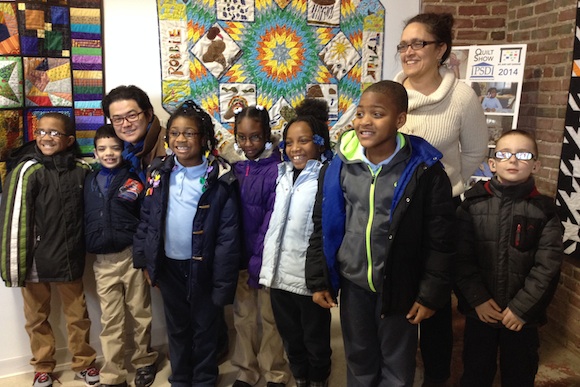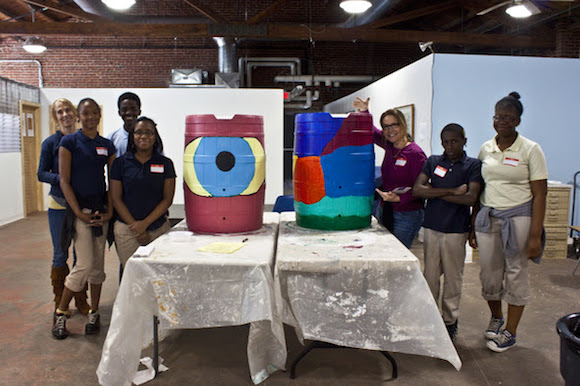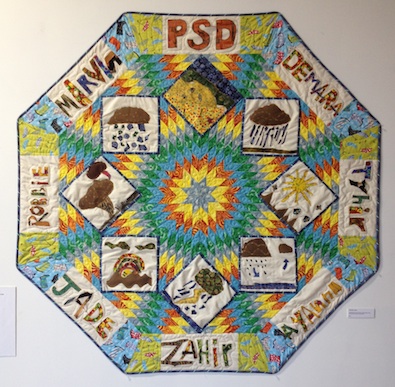Theatre Horizon's Autism Drama Program began with a single child and one little word.
“Eight years ago, we were approached by a mom, and Erin Reilly, our artistic director, said, 'Yes,'” explains Leigh Mallonnee, education director at the professional non-profit theater company in Norristown, an area northwest of Philadelphia.
The little boy's parents, both actors on the Philly scene, noticed their son “blossomed” when their theater friends babysat him. From there, Theatre Horizon's Autism Drama Program grew into theater classes for kids with autism. Then, thanks to a partnership with Philadelphia Young Playwrights, they launched a course called “Playwriting and the Art of Storytelling” for adults on the autism spectrum.
It's one of several new programs designed to make local institutions more accessible to people with a range of barriers, allowing them to participate fully in the city's arts, culture and science scenes.
Theatre Horizon isn't the only organization tailoring its programming to people on the autism spectrum. Timshel Purdum, director of education and lifelong learning at The Academy of Natural Sciences, says the Drexel-affiliated museum has always tried to accommodate people on the spectrum, but wanted to “make the museum even more welcoming.”
A 2012 planning grant from the Institute of Museum and Library Services allowed the Academy, along with its main project partners, Adventure Aquarium's non-profit wing, the New Jersey Academy for Aquatic Sciences, and the A.J. Drexel Autism Institute, to develop new ways to open the Aquarium and the Academy of Natural Sciences to all families.
That includes the periodic Access to Science Initiative. The organizations open their doors either early or after-hours “just for families with children on the spectrum…to give them a chance to experience our institutions when [they're] not as crowded.”
Purdum hopes the “practice” of attending these events might allow children with developmental challenges to “come back on a regular day when they've gotten to know us better.” (The Academy's next Access to Science event will be June 8 at 9 a.m.)
Consultants have also helped the Academy develop “Museum Stories,” special guides available on the Academy website or at the front desk. They help kids with autism or developmental challenges prepare for their visit with easy-to-understand first-hand narratives about what they'll see, hear, feel and smell at the museum, from butterflies to T-Rex teeth.
As the program expands, Purdum hopes Museum Stories could transition into an interactive app. Ultimately, the Academy wants to share these innovations with other museums looking for ways to open their doors a bit wider. The Academy's autism programs have already drawn a lot of grateful e-mails from participating parents.
“The goal is to not single anybody out,” she emphasizes. “The goal is to make us as welcoming as possible whenever we can.”
Being welcoming to everyone has also been a theme at Mt. Airy Art Garage (MAAG) in Northwest Philadelphia. This year, co-founder Linda Slodki partnered with Karen Leslie-Henry and Marcia Volpe at Germantown's Pennsylvania School for the Deaf (PSD).
Alongside several other organizations and schools, PSD teamed up with MAAG to design and paint rain barrels for nearby Germantown Avenue. One of the students' barrels was selected for display in an exhibit with the EPA.
Last fall, Leslie-Henry, who directs PSD's department of continuing education and community outreach, jumped at another chance to get her youngsters involved at MAAG. Volpe, PSD's director of special projects and professional development, coordinated the students' participation in a quilting project.
Quilter Sarah Bond, who teaches at MAAG, partnered with PSD faculty to develop a project tied to the kids' science curriculum. Bond visited the school, helping kids work on individual quilt squares based on weather patterns; the kids took two field trips to Bond's studio space at MAAG.
“I wanted them to understand that this is an area of professional art,” says Volpe. “They loved it. Literally, jaws dropped.” Now, the kids' work is part of “Art of the Quilt: Unfolding Our Stories,” a juried city-wide show at MAAG.
“The crowning, wonderful piece for us was that Mt. Airy Art Garage went way out of their way to have our students really see themselves as artists,” adds Volpe. “Just like the other artists in the exhibit.” Since the quilt show's opening was outside school hours, Slodki opened MAAG's doors early for a reception, snacks and all, for the young quilters.
It's great when organizations can open doors to special-needs participants, but about people who can't leave their homes or facilities?
According to Melinda Steffy, general manager at LiveConnections, this could mean Philadelphians with severe cognitive or physical disabilities, or brain injuries. With its venue partner, the downstairs stage at Philly's World Café Live, LiveConnections already operates Bridge Sessions, which bring diverse, interactive musical programs up close and personal to under-served or special-needs audiences three times a year.
Now, a $100,000 matching grant from the 2011 Knight Arts Challenge (doubled to $200,000 with help from the Wyncote Foundation and the 25th Century Foundation) has allowed LiveConnections to install state-of-the audio and video equipment. With help from partner organization Art-Reach, they are now in their pilot season of streaming Bridge Sessions live to those who can't get there in person.
“We have three robotic cameras that can be installed in different positions in the venue, to capture the stage or floor level, and one hand-held camera,” says Steffy. They also have cutting-edge audio and live-switching capabilities like those at a televised sporting event.
Participants have included the Woods facility in Langhorne, which streamed a Bridge Session to about 120 people.
“It was really amazing to me to see how much the interaction of the session and the experience carries through, even with the screen in between,” says Steffy who attended the event there herself. “People would still call out answers, participate in all of the hand motions…it was the same kind of energy as when people are onsite in a session.”
“The music has this power to motivate and inspire and transcend people out of their current circumstances for a little bit,” she continues. “Into a place where they feel happy and they belong to something and are participating.” In the future, she thinks streaming to senior residences would be a natural fit for the program.
Back at Theatre Horizon, staffers and their Young Playwrights partners aim their program at a population often lacking services: adults with autism. Now heading into its fifth six-week session of 90-minute Saturday classes, the program pairs storytelling enthusiasts ages 17 to 30+ with Young Playwrights' teaching artists, three professional actors, and a few volunteers, who help participants develop their own plays and then present staged readings.
“Individuals with autism often have really imaginative inner lives…and this gives them an opportunity in a way they're passionate about to voice their own story,” says Mallonnee, adding that the program is not “drama therapy,” but “a drama class designed for people with autism,” who, just like “neurotypical people,” want a chance to get creative.
Classes involve improv games, lessons on dialogue and story structure, and practice in vocal and physical communication on stage. This June, for the first time, Theatre Horizon's Autism Drama participants will have access to a dedicated Young Playwrights festival, and the opportunity to have their work fully staged by professional artists.
Individuals with a wide range of disabilities should never be viewed a single group, but many organizations in our region are embracing the larger theme of inclusiveness. As Volpe says of seeking more arts partnerships for PSD, “We're trying to help other people understand that creativity…is not necessarily limited by physical disability.”
ALAINA MABASO, a Philadelphia-based freelance journalist, has landed squarely in what people tell her is the worst possible career of the twenty-first century. So she makes Pennsylvania her classroom, covering everything from business to theater to toad migrations. After her editors go to bed, she blogs at http://alainamabaso.wordpress.com/. Find her on Twitter @AlainaMabaso.




